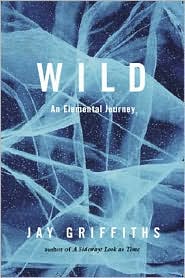Is it possible for language to be wild? Can the allure of alliteration beckon us like the green alleyways of the Amazon, or the alpine of the Andes, like aspens, like Adelaide penguins? Can rollicking rhyme roll through our souls like wayward waves, the motion of the ocean, the snake baking in the sun, the sound of the round sun beating in our ears? Can sentences with syntax, parallelism, modifiers, and proper grammar mountain lake invigorate, storm cloud startle, or Osprey awe?
Until recently I might have said no. I would have said words can attempt to explain wild but words can never be wild. Jay Griffiths has proven me mistaken. In her book Wild: An Elemental Journey, her words spill across the page like a violent violet sunset, they crash around in the mind like a stamping elk herd thrusting across a field to find water or food or joy or to dodge a wolf attack. Her words are a wild journey.
“What is wild cannot be bought or sold, borrowed or copied. It is. Unmistakable, unforgettable, unshamable, elemental as earth and ice, water, fire and air, a quintessence, pure spirit, resolving into no constituents,” she writes in one definition of wild. “Don’t waste your wildness: it is precious and necessary. In wildness, truth. Wildness is the universal songline, sung in green gold, which we recognize the moment we hear it. What is wild is what drives the honeysuckle, what wills the dragonfly, shoves the wind and compels the poem. Wildness is insatiable for life; neither truly knows itself without the other.” Words too are insatiable for wildness and my words have begun to finally know themselves as they invite in and uncover Griffiths’s wildness which truly has always been here dancing in the air around me as newly hatched spring mayflies.
“In the forests though, time wiggles, rivers wiggle, paths wiggle, vines, plants and tendrils wiggle. All things that represent life at its most vital and wild wiggle. Words wiggle into metaphor; sperm wiggles; dancing and jokes and giggling wiggle; the shape and character of tumultuous life is a wiggling one,” Griffiths writes, showing us that wildness and poetry both find their own path—a path that slides, elides, and altogether ignores the “straight and narrow.”
But her words and her wildness are not about resisting. They are about giving in, about sliding one’s naked body into the coursing river and going where it goes. She writes, “Artists, who remember their wildness better than most, are animal artists, lifting their heads to sniff a quick wild scent in the air, and they know it unmistakably, that strange and absolute obedience.” It is this obedience that sends me crashing through the underbrush of my living room compelled by her wild words to write out my own wiggling wildness, to send it forth in sounds and shapes, ideas ejaculating, giving into and producing the ever-newness of wild.
—
Jamie Barber teaches writing at Penn State University. She currently lives in State College, Pennsylvania, experiencing the wildness of love and motherhood with her partner and new son.

